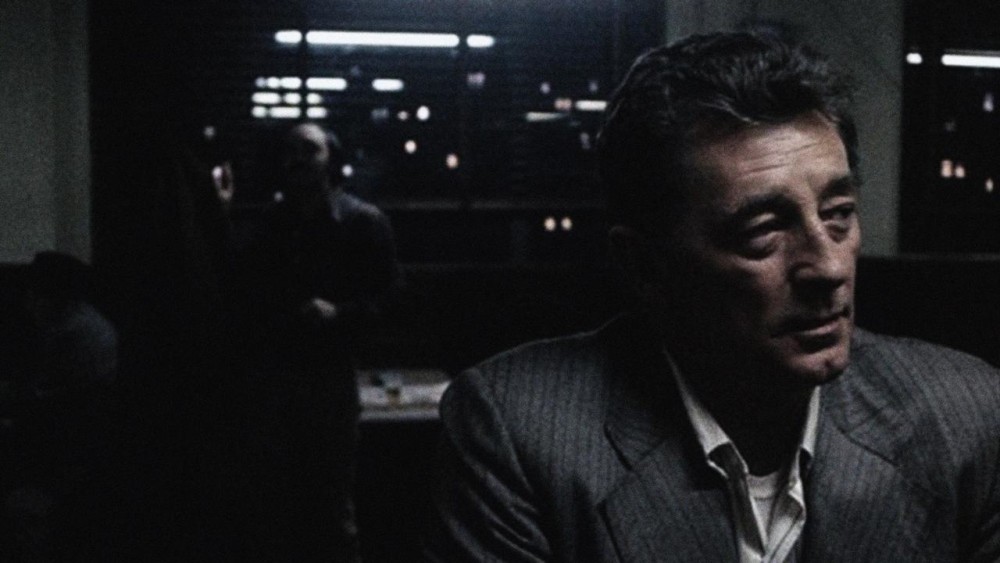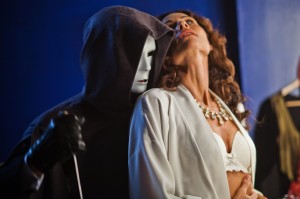
Peter Yates’ formidable crime thriller The Friends of Eddie Coyle is a taut, atmospheric three-for-one package. First off, it’s a top-class slice of pulpy neo-noir, soaking in the narrative twists and linguistic colour inherent to grubby tales of low-level gangsterism. It’s also a great city film, full of excellent unadorned photography that showcases the wet earth tones and concrete grays of an early-70s Boston autumn. But most of all it’s a strikingly unsentimental character piece where double-crosses, back-stabbings, and corporeal punishment are enforced and justified through that oldest nugget of crime-lifer wisdom, “This is nothing personal. This is just how it has to be.”
Old hand Eddie “Fingers” Coyle (Robert Mitchum, in an amazing performance) is a garbageman by day, and a low-level gunrunner for a local mob boss by night. He’s trying to cut a deal to avoid jail time by selling out a contact, but as there must be in these stories, there are elements, including his associate Dillon (Peter Boyle, rock solid), that conspire against him. He doesn’t have the reputation or resources to act as a shield or a buffer. He is expendable, and he knows this, but what eludes him is just how expendable he is. There isn’t a shred of romance or nostalgia to be found in this film. Every shady occurrence in the story happens so matter-of-factly and without fanfare that it skirts straight-up nihilist territory. What keeps the film from becoming that facile is the drab, blue-collar lens through which street-level thuggery is framed. It’s not a code, or a lifestyle, it’s just a job. Nothing personal. Getting guns or robbing a bank is no different than changing the oil on a car. There’s a method. Just follow the instructions and you’ll be fine.
Much of the film’s narrative concerns this very specific kind of codified action that blossoms in a strain of modern, post-noir crime movies like Le samouraï or Point Blank. Coyle describes at length the circumstances that led him to receive what he calls his second pair of knuckles (here’s a hint, it involves a chest of drawers, a hand, and a swift kick). That’s just the way it was, he says. The criminal element in the rest of the film are just as vigorous and rigid with procedure. During an extended heist sequence scattered across the second act of the film, instructions and consequences are doled out with a nerve-shredding mix of terseness and gravity. There is as little time spent suffering bullshit as there is considering the seriousness of the events occurring. This is partly because The Friends of Eddie Coyle focuses on the bottom rung of the pecking order, and that everyone involved are either self-aware grunts or small-timers; the bigger picture need not apply. But it’s also because nearly ever exchange in the film is framed as a psychological arm-wrestling match. Some are more forthcoming with their confrontational nature than others, but the ones that aren’t are so well-modulated and well-contextualized that they carry the same weight, even though someone in the conversation is someone else’s sucker. That’s the ultimate irony of the film: Eddie Coyle has no friends, just connections. Everybody in the film seems to exist in transient spaces: parking lots, 24-hour diners, construction sites, sports arena, wooded areas, hockey rinks. No one stays long. The characters live and die by their ability not to kill or influence, but to transact. It’s worse in this world to run out of collateral than to run out of muscle.
As you would expect from a new Criterion Collection-anointed transfer, the film looks and sounds amazing. It was lensed by Victor J. Kemper, who would go on to work on another top-tier heist-heavy urban crime drama from the 1970s, Dog Day Afternoon. Both movies have a marked facility with local textures, but while the Brooklyn of Sidney Lumet’s film pops and fizzles with summertime life, the Boston of The Friends of Eddie Coyle trades heavily in the cold drabness of an incoming winter. Appropriately, there’s a season-like anticlimactic inevitability to the film’s events that amplifies its fatalistic edge. The spectre of obsolescence and death is cast against the scrappiness of youth; Bobby Orr, the great Boston Bruins defenceman, serves as both a allegorical counterpoint and a narrative pivot point in the film’s climax. Hockey, like mob gruntwork, isn’t a young man’s game. There’s always someone gunning for your spot, and you can only keep up for so long.
—
The Friends of Eddie Coyle is available on DVD and Blu-Ray from Amazon.
Directed by Peter Yates; written by Paul Monash; adapted from the novel The Friends of Eddie Coyle by George V. Higgins; starring Robert Mitchum, Peter Boyle, Richard Jordan, Steven Keats, Alex Rocco, and Joe Santo; 103 minutes.



 Derek
Derek
 Isabelle
Isabelle